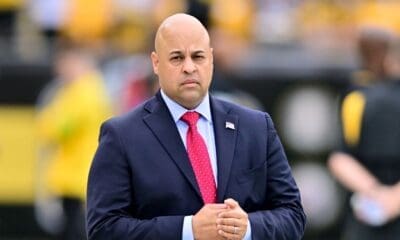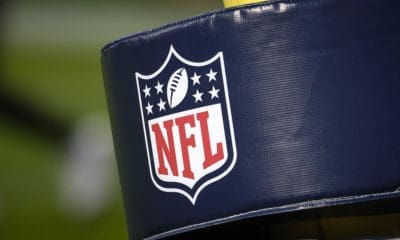NFL
Steve Wilks, former Steelers Assistant Ray Horton Join Brian Flores’ Lawsuit vs. NFL

Former NFL head coach Steve Wilks and former Steelers defensive back coach Ray Horton have joined Brain Flores’ lawsuit against the NFL regarding discrimination against minorities in the hiring practices of the league’s coaches. Wilks and Horton joined the lawsuit with claims against the Arizona Cardinals and Tennessee Titans.
The amended lawsuit also adds the Houston Texans as Flores claims the organization retaliated against him by removing him from consideration as head coach after speaking out against racial discrimination in the NFL. The lawsuit names the Texans, Cardinals and Titans along with the NFL, Miami Dolphins, Denver Broncos, New York Giants and 26 “John Doe” NFL teams.
“I continue to be humbled by the outpouring of support in connection with my claims against the NFL and applaud Steve Wilks and Ray Horton for standing up against systematic race discrimination,” Flores said in a statement released by his lawyers. “Their claims are the unfortunate reality of the problems facing Black coaches in the NFL which our collective hope in this case is to end once and for all.”
Wilks was the head coach of the Cardinals in the 2018 season and led the team to a 3-13 record before being fired and replaced by current head coach Kliff Kingsbury. The statement put out by Wigdor Law on behalf of Wilks claims that he was never given a fair chance to succeed and was crippled by poor personnel decisions made by general manager Steve Keim and his own off-the-field issues.
“As alleged in the amended complaint, in 2018 Mr. Wilks was discriminated against by the Arizona Cardinals in a manner consistent with the experiences of many Black coaches,” wrote Wigdor Law. “Mr. Wilks was hired as a ‘bridge coach’ and was not given any meaningful chance to succeed. He was unfairly and discriminatorily fired after just one season. His white GM, who made poor personnel decisions and was convicted of a DUI in the offseason, was given a contract extension…”
“Mr. Wilks was replaced by a white coach, Kliff Kingsbury, who had no prior NFL coaching experience and was coming off of multiple losing seasons as a Head Coach at Texas Tech. Mr. Kingsbury, armed with quarterback Kyler Murray, has been given a longer leash than Mr. Wilks and, to his credit, has succeeded. That said, Mr. Wilks, given the same opportunity afforded to Mr. Kingsbury, surely would have succeeded as well.”
There is no telling if success would’ve been had under Wilks had he was given a second season. It is worth noting that Wilks 3-13 season came when the team was coming off unimpressive 7-8-1 and 8-8 seasons. In 2018, the team wasn’t expected to compete as they had hoped to develop quarterback Josh Rosen who was just drafted with the 10th overall pick. After a bad rookie season, Rosen was replaced by Murray for the 2019 season.
That 3-13 record was there worst record since the 2000 season, still it is extremely rare for a coach to get fired after only one season. Since the salary cap was instituted in 1994, there has only been 18 head coaches to get fired either during or immediately after their first season. Both Urban Meyer and David Culley were fired this past year during and after their first seasons as head coach of the Jacksonville Jaguars and Houston Texans.
Keim remains as the general manager of the Cardinals despite that subpar season and the DUI. Since the 2018 season, the Cardinals have found success behind former first-overall pick Murray. After a 5-10-1 season in 2019, the Cardinals have gone 19-14 overall including an 11-6 record to make the NFL playoffs this past season. Although the team has suffered late-season collapses in both 2020 and 2021 under Kingsbury.
Wilks is back in the NFL though as he was hired as the Carolina Panthers defensive passing game coordinator and secondary coach back on February 9. After being fired from the Cardinals he spent the 2019 season as the defensive coordinator for the Cleveland Browns and spent the 2021 season as the defensive coordinator for the University of Missouri football team.
“When Coach Flores filed this action, I knew I owed it to myself, and to all Black NFL coaches and aspiring coaches, to stand with him,” Wilks said in a statement released by his lawyers. “This lawsuit has shed further important light on a problem that we all know exists, but that too few are willing to confront. Black coaches and candidates should have exactly the same ability to become employed, and remain employed, as white coaches and candidates. That is not currently the case, and I look forward to working with Coach Flores and Coach Horton to ensure that the aspiration of racial equality in the NFL becomes a reality.”
Horton though has been out of the NFL since 2019 and only coached in the NFL for one season after a 2016 stint as the Browns’ defensive coordinator. He previously spent time with the Pittsburgh Steelers as the teams’ secondary coach from 2004-10, winning two Super Bowls with the organization. He joins the lawsuit accusing the Titans of not seriously considering him as a head coach candidate when the team interviewed him for the position in 2016.
“Mr. Horton was a long time NFL coach and Defensive Coordinator when he was interviewed for the Tennessee Titans Head Coach position in January 2016,” wrote Wigdor Law. “This turned out to be a completely sham interview done to comply with the Rooney Rule and to demonstrate an appearance of equal opportunity and a false willingness to consider a minority candidate for the position. Indeed, the Titan’s’ all-white ownership and management ultimately hired Mike Mularkey, a white candidate, for the Head Coach position…”
“Years later, in 2020, Mr. Mularkey admitted in a podcast interview that the Titans, ‘Told me I was going to be the head coach in 2016, before they went through the Rooney rule. And so I sat there knowing I was the head coach in 2016, as they went through this fake hiring process knowing, knowing a lot of the coaches that they were interviewing, knowing how much they prepared to go through those interviews, knowing that everything they could do and they had no chance to get that job.'”
Mularkey was the interim coach for the Titans in 2015, so the appointment of him as head coach in 2016 didn’t come as much of a shock. Still, he is one of the first to publicly admit what has been an unspoken and accepted reality since the Rooney rule came in place in 2003, that teams have interviewed minority candidates despite having already made up their minds on who to hire as their next head coach solely to avoid violating the rule. This claim is at the heart of the lawsuit against the NFL.
The Titans disputed the claim in an email to ESPN prior to the lawsuit. “Our 2016 head coach search was an open and competitive process during which we conducted in-person interviews with four candidates and followed all NFL rules,” the statement said. “The organization was undecided on its next head coach during the process and made its final decision after consideration of all four candidates following the completion of the interviews.”
“I am proud to stand with Coach Flores and Coach Wilks in combatting the systemic discrimination which has plagued the NFL for far too long,” Horton said in a statement released by his lawyers. “When I learned from Coach Mularkey’s statements that my head coach interview with the Titans was a sham, I was devastated and humiliated. By joining this case, I am hoping to turn that experience into a positive and make lasting change and create true equal opportunity in the future.”
Despite the Rooney rule, which requires teams to interview at least one (changed to two in 2020) external minority candidates to be interviewed for head coaching jobs, being added in 2003 only six of the league’s 32 head coaches are minorities. In 2022 the rule was changed and now requires all teams to have at least one minority on their offensive coaching staff, since the league is trending towards hiring more offensive-minded coaches as a head coach. The league also expanded the rule to include women of all nationalities.
















